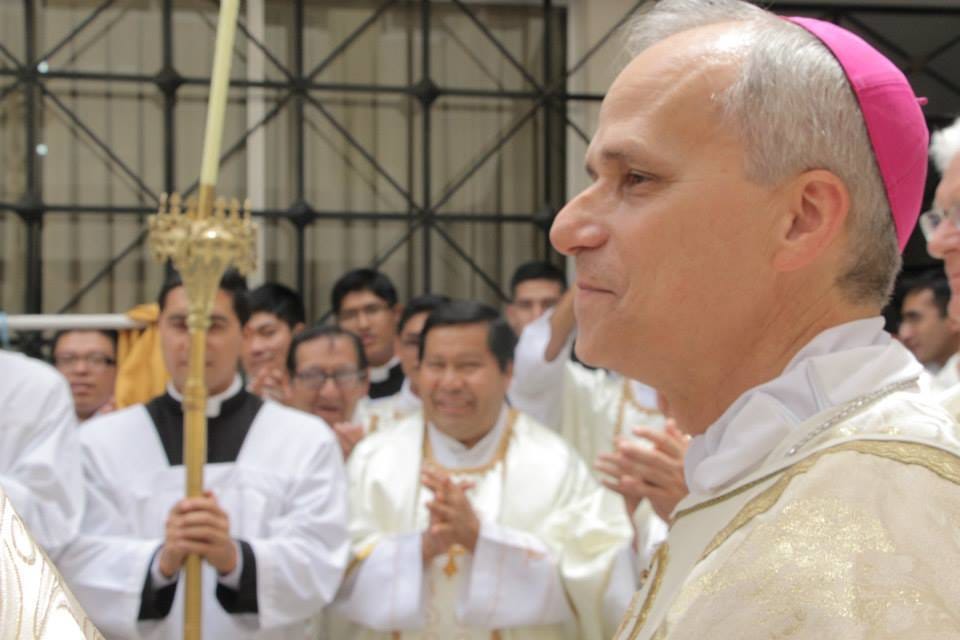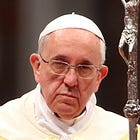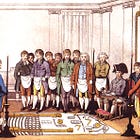Card. Prevost elected by conclave as Leo XIV—Is he Catholic?
Leo XIV, Cardinal Prevost, has been elected by the Conclave. He is thus a true successor of Paul VI: but is he a successor of St Peter?

Leo XIV, Cardinal Prevost, has been elected by the Conclave. He is thus a true successor of Paul VI: but is he a successor of St Peter?
Cardinal Robert Francis Prevost has been elected by the 2025 Conclave to succeed Francis, and taken the name Leo XIV.
Not much is known about Prevost.
One striking image is that as prefect of the dicastery of bishops, he oversaw
The appointment of the notoriously liberal Cardinal Robert McElroy to one of the most prominent episcopal sees in the USA
The deposition of Bishop Joseph Strickland, one of the most conservative bishops in the USA.
Further research earlier in the week found that Prevost…
Repeats the idea which Francis added to the Catechism of the Catholic Church, namely that “the death penalty is not admissible”1
Conspicuously failed to profess the faith in relation to the grave threats to faith and morals in our day—to the point in which this silence is taken as “discretion” and counted in his favor as a candidate
Indicated the state of his mind through his cooperation with the appointment of notorious liberals and the deposition of conservatives
Cooperated in the consolidation of Francis’ longest-lasting legacy, namely the appointment of bishops embodying his ideals
Implicitly denied the dogma of the Church’s visible unity, by casting it in the terms rejected and refuted by Pope Pius XI in Mortalium Animos
Minimized the importance of doctrine in the role of the bishop, contrary to Sacred Scripture, Apostolic Tradition and the general sense of theology
Dismissed those who “prefer the security of answers already experienced in the past”
Promoted the modernist idea of “synodality” in such a way as to destroy the traditional concept of the bishop’s threefold power of teaching, ruling and sanctifying his flock
Explicitly denied that a bishop is a “prince” in his diocese, contrary to the teaching of the magisterium and the liturgy
Replaced the traditional understanding of the bishop’s role with that of “service,” presented in naturalistic terms, and which he has already separated from doctrine and governance through his other words (even while he retains references to teaching and shepherding).
All these points are established in greater detail in the paper attached. We concluded from this research:
… Prevost is not a coward or a [discreet] tactician, but a loyal son of Francis, and that he will continue the work of his master and benefactor—even if he does so in a more discreet and moderate way.
This raises grave questions about whether or not Prevost can be said to profess the Catholic faith at all, and thus whether he is a member of the Church. If he is not a member of the Church, then it is not possible for him to be validly elected as pope.
At the very least, there is serious doubt on the matter: and a man whose visible membership in the Church is itself in serious doubt can only be doubtfully elected to the papacy, even if the conclave is unanimous. Should such a man be elected, the resulting doubt would not be about his popularity or policies, but about his very authority. This is why great theologians and canonists held that a doubtful pope is no pope at all.
Needless to say, these points have implications that extend beyond just Prevost, applying also to those other cardinals who have been “discreet” and “moderate” in the face of Francis’ doctrinal aberrations. It is not enough to ask whether a man is prudent, discreet, or personally sincere. The question is whether he professes the faith whole and entire, in public and without compromise. If the answer is not a clear “Yes,” then the conclusion is clear: he cannot be validly elected or accepted as pope.
You can see the full report, with all supporting evidence, here:
UPDATE: 22.30 BST
Here is Prevost’s speech from the Loggia. It is very notable that he refers to the “Synodal Church”—having thrown off even the “Conciliar” part of the self-titled “Conciliar/Synodal Church.” (For more on what the “Synodal Church” really is, see here.)
Peace be with you all!
Dearest brothers and sisters, this is the first greeting of the Risen Christ, the Good Shepherd who gave His life for the flock of God. I too would like this greeting of peace to enter your hearts, to reach your families, all people, wherever they may be, all peoples, the whole earth. Peace be with you!
This is the peace of the Risen Christ — a disarmed peace and a disarming peace, humble and persevering. It comes from God, God who loves us all unconditionally. We still hold in our ears that voice — weak but always courageous — of Pope Francis who blessed Rome!
The Pope who blessed Rome gave his blessing to the world, to the whole world, that Easter morning. Allow me to continue that same blessing: God loves us, God loves you all, and evil will not prevail! We are all in God's hands. Therefore, without fear, united hand in hand with God and with each other, let us go forward. We are disciples of Christ. Christ goes before us. The world needs His light. Humanity needs Him as the bridge to be reached by God and by His love. Help us — and help one another — to build bridges: through dialogue, through encounter, uniting all of us to be one people, always in peace. Thank you, Pope Francis!
I also want to thank all the brother cardinals who chose me to be the Successor of Peter and to walk together with you as a united Church, always seeking peace, justice, and striving to work as men and women faithful to Jesus Christ, without fear, to proclaim the Gospel, to be missionaries.
I am a son of Saint Augustine, an Augustinian, who said: “With you I am a Christian, and for you I am a bishop.” In this sense, we can all walk together toward that homeland which God has prepared for us.
To the Church of Rome, a special greeting! [applause] Together, we must seek how to be a missionary Church, a Church that builds bridges, dialogue — always open to receive, like this square with open arms. Everyone, all those who need our charity, our presence, our dialogue, and our love.
And if you permit me, a word, a greeting to all and in particular to my dear Diocese of Chiclayo, in Peru, where a faithful people accompanied their bishop, shared their faith, and gave so much — so much — to continue being a faithful Church of Jesus Christ.
To all of you, brothers and sisters of Rome, of Italy, of the whole world, we want to be a synodal Church, a Church that walks, a Church that always seeks peace, that always seeks charity, that always seeks to be close especially to those who suffer.
Today is the day of the Supplication to Our Lady of Pompeii. Our Mother Mary always wants to walk with us, to stay close, to help us with her intercession and her love.
So I would like to pray together with you. Let us pray together for this new mission, for the whole Church, for peace in the world, and let us ask this special grace from Mary, our Mother.
Hail Mary...
[Source]
HELP KEEP THE WM REVIEW ONLINE WITH WM+!
As we expand The WM Review we would like to keep providing free articles for everyone.
Our work takes a lot of time and effort to produce. If you have benefitted from it please do consider supporting us financially.
A subscription gets you access to our exclusive WM+ material, and helps ensure that we can keep writing and sharing free material for all.
(We make our WM+ material freely available to clergy, priests and seminarians upon request. Please subscribe and reply to the email if this applies to you.)
Subscribe to WM+ now to make sure you always receive our material. Thank you!
Further reading:
Follow on Twitter, YouTube and Telegram:
https://larepublica.pe/sociedad/2022/04/18/robert-prevost-la-pena-de-muerte-no-es-admisible-lrnd?#





Am I a prophet, or was it just so predictable? I’ve been shouting from the rooftops that a more moderate (but no less equally zealous) advocate of conciliarism would follow Francis, just as Ratzinger followed JPII:
Two steps forward, one step back. That’s how you take the steam out of any burgeoning counterrevolution and consolidate the gains made by your predecessor.
Now the SSPX will be able to sell its deal, and achieve the de jure sellout it achieved de facto long before 2012. Now everyone will say this is a man they can work with. Now turning back the clock will lose its urgency. And with every subsequent putative claimant, calls to revert to Tradition will seem more eccentric, unrealistic, and improbable, such that, en masse, the psychological inertia beckons to us to accept the new reality, however distasteful, and make the best of the situation.
Most will succumb.
But these are satanic whispers, demoralizing us into surrender.
That’s the strategy.
No, I’m no prophet. I just have the thread to Rome’s (and Menzingen’s) modus operandi. This was entirely predictable, proven by the fact I HAVE BEEN predicting it everywhere online, for years.
We can only hope that Our Lord will appear to him as he did to St. Teresa and showed her the place reserved for her in Hell, if she continued on her lukewarm path in the religious life. The people who identify the seven headed dragon of the Apocalypse with the false VII Popes, may be right, in that case there is one more, "And the beast which was, and is not: the same also is the eighth, and is of the seven, and goeth into destruction.